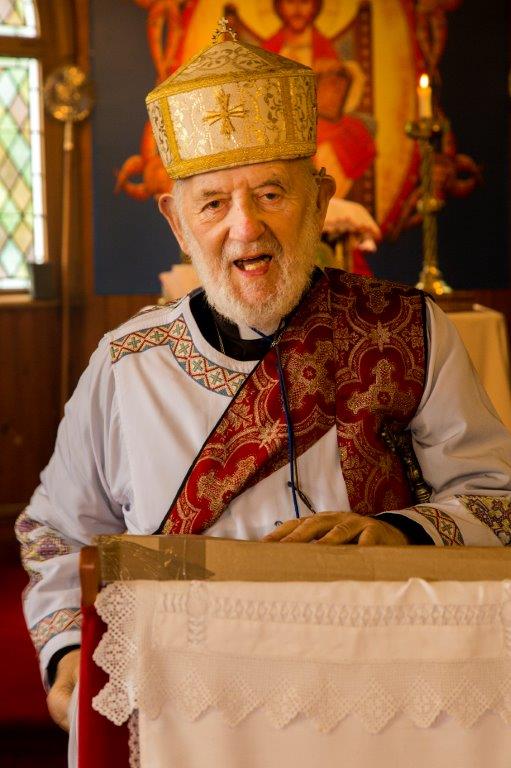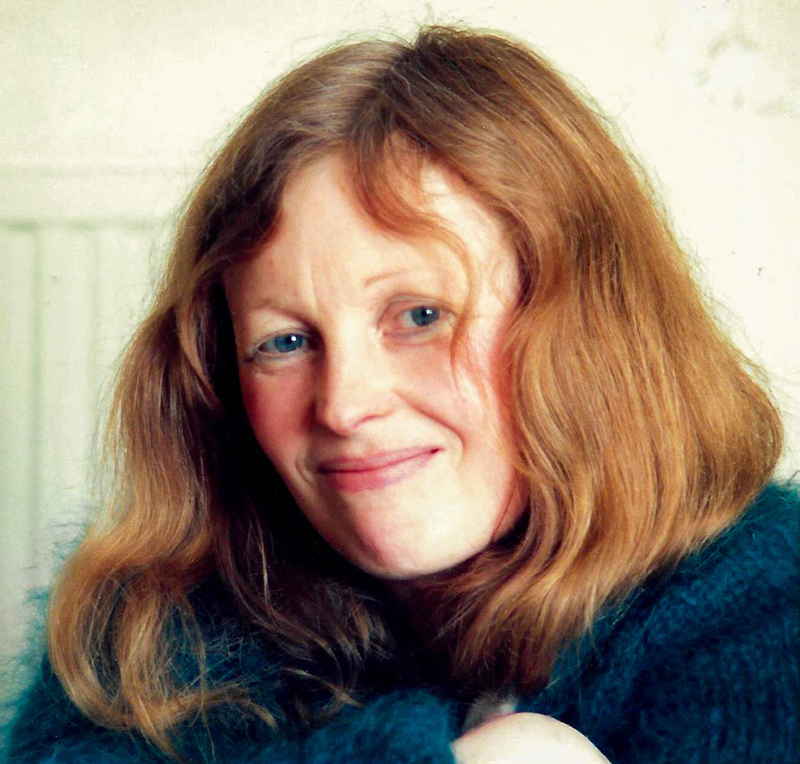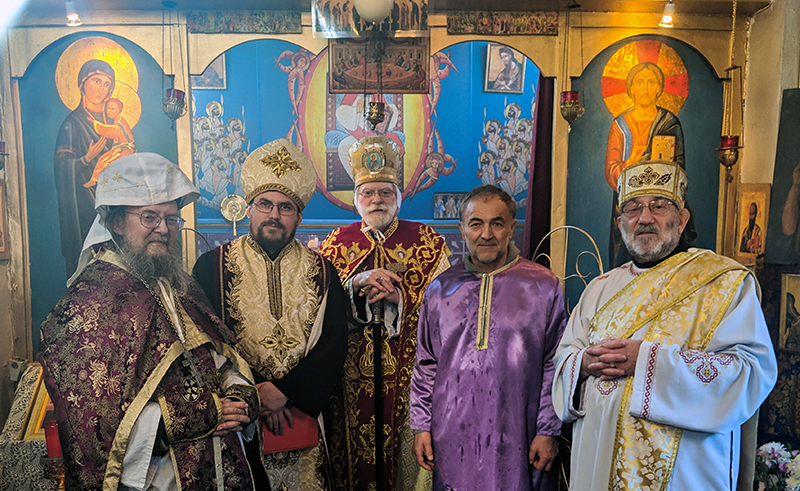Ordinations & funeral
Recent Ordinations
On Sunday, 16 December, at St. Mark & St. Hubert’s Church at Cusworth, Doncaster, His Grace Bishop David ordained Reader Vladimir Sandis Roze to the Order of Subdeacon; and at the Church of Christ the Saviour, Winton, Bournemouth, Metropolitan Seraphim ordained Father James Maskery to the Order of Hegoumenos.
Funeral of Vanessa Tinker
Following a Requiem Liturgy held at Charlton on 25 November, the funeral service of the late Vanessa Tinker, the ikonographer of the British Orthodox Church, took place at St. Thomas’s, Charlton, on 17 December, being the fortieth day after her repose. The service was conducted by Metropolitan Seraphim, assisted by Fr. James and Deacon Antony. The coffin was borne into a full church to the singing of ‘Dido’s Lament’ (from Henry Purcell’s Dido & Aeneas). The organ was played by Mr. John Dawson. Following the Prayer of Thanksgiving, the congregation sang the hymn, ‘Now Thank we all our God’ and the lesson from 1 Corinthians XV: 12-022 was read by Father Dominic Pyle-Bridges. At the beginning of his address, Abba Seraphim stated,
“Art is the expression or application of human creative skill and imagination. Through it we reflect the beauty of God, the Creator of all things, as the Book of Ecclesiastes says, ‘He has made everything beautiful in its time.’ Vanessa was a many-dimensional artist: as a painter she produced reflective still-life pictures of buildings, objects or scenery; impressive portraits of friends and bustling scenes of daily life; she was also a fine etcher, a potter, a keen photographer, a carpenter, an ikonographer, an interior designer, and a garden planner. Whatever she turned her hand to revealed the world around her from her own perspective, as Henry Ward Beecher claimed, ‘Every artist dips their brush into their own soul, and paints their own nature into their pictures’. The result was often to highlight the charm and uniqueness of persons and places, as George Sand wrote, ‘The artist vocation is to send light into the human heart’.”
Jim Kinsella then sang The Russian Kontakion of the Departed and the paschal theme of the funeral was emphasised by the congregation singing the hymn, ‘The Day of Resurrection’ composed by St. John of Damascus. Following the prayers, Absolution and Psali Adam, the coffin was borne out of the church to the singing of the hymn, ‘Thine be the glory’, sung to the tune from Judas Maccabeus by G.F.Handel, another of Vanessa’s favourite composers. The coffin was then accompanied to Eltham Crematorium by Deacon Antony, who presided over the Committal.
Archdeacon Mark laid to rest at Babingley
Following the repose of Archdeacon Mark Saunders on 27 November, a Requiem Liturgy was celebrated at the Church of St. Mary & St. Felix at Babingley, Norfolk by Metropolitan Seraphim on Sunday, 2 December and his funeral took place at noon on 10 December. The service was conducted by Metropolitan Seraphim, assisted by Abba David, Bishop of Priddy, and Father James and the church was filled with family, friends, neighbours and regular worshippers.
As with all services, it began with the ‘Prayer of Thanksgiving’ followed by the hymn, “Now Thank we all our God”. His grandson, Nick Chapman, read a short poem by Linda Ellis about leading a meaningful life. Following this the lesson from St. Paul’s first Epistle to the Corinthians was read by Valeria, Viscountess Coke. In his address, Abba Seraphim gave a brief outline of Archdeacon Mark’s long and full life and spiritual commitment to God and the Orthodox Church; before preaching on the Christian Hope of the Resurrection, drawing on the message enshrined in the ‘Russian Kontakion of the Departed’, which was also chanted, after which all present sang the Paschal hymn, “The Day of Resurrection.” Father James led the Litany of the Departed and Abba David offered further prayers, including the ‘Prayer for Deacons’ which included the phrase, “As he was a minister of Thine altar upon earth, let him minister at Thy heavenly altar wherein is neither spot nor blemish, taking delight in Thy holy and blessed will.” Abba Seraphim then pronounced the Absolution, and the congregation sang the hymn, “O Jesus, I have promised/To serve Thee to the end” in recognition of Archdeacon Mark’s profound commitment to God and the Church. The Psali Adam was then chanted as the congregation filed outside and followed the coffin and clergy into the churchyard, where Abba David pronounced the committal as Archdeacon Mark was laid to rest next to Sybil, his beloved wife of seventy years, and all present chanted “Memory Eternal!”
Archdeacon Mark Saunders – Memory Eternal!

Having contracted pneumonia last week, Archdeacon Mark was admitted to the Queen Elizabeth Hospital at King’s Lynn, where he reposed in the Lord on 27 November, just over a month after marking his 93rd birthday.
Robert William John Saunders was born at Cirencester, Gloucestershire, on 18 October 1925, where his father was a market gardener with a local smallholding. The family later moved to Folkestone in Kent. During the Second World War, as a soldier, he served in both India and Egypt, where he recalled giving support to many refugees. At the end of the war he met Sybil, who was serving in the Land Army and they married at Cheshunt in Hertfordshire in 1945. Having trained as an engineer, he became a General Store keeper and also ran the “Clockhouse Store” at Terrington, as well as a couple of fish & chip shops. From an early age he was a committed and active churchgoer and was an altar server and sacristan at St. Peter’s Church, West Lynn. When their parish priest left the Church of England as part of the “Pilgrimage to Orthodoxy” movement he was among several members of the congregation who followed him in 1993. He and Sybil were baptised and chrismated by the late Father Andrew Winlo at Cusworth on 8 October 1995 and became communicant members of the British Orthodox Church. He was ordained as a Reader (12 November 1995) and Subdeacon (28 January 1996) at the hands of Abba Seraphim and served at the Orthodox Chapel of St. Felix in the African Violet Centre at Terrington St. Clement. In October 1999 he and Sybil were among members of the St. Felix Parish who accompanied Abba Seraphim on his XIXth Visit to Egypt, where they were received by the late Pope Shenouda III.
He was always a very efficient handyman and when the British Orthodox Church was offered the use of the former Anglican chapel at Babingley in 2000 he used his practical skills to adapt the church for Orthodox worship. His commitment to the church was always impressive and both he and Sybil twice moved home in order to be closer to the church. Recognising his gifts and qualities, Abba Seraphim proposed his ordination to the diaconate, which took place at the Eritrean Church in Camberwell on 5 February 2000, when he assumed the religious name of Mark in honour of St. Mark the Evangelist. When their parish priest moved to Scotland in 2007, Deacon Mark became the resident minister in charge of the Parish, whilst Abba Seraphim assumed the direct pastoral oversight by visiting Babingley twice a month between 2007-2015 with Deacon Mark presiding at the regular offices which were held on the other Sundays.
On 28 May 2015 Sybil Saunders reposed in her 90th year after long months of declining health, bravely borne, during which she was cared for with great tenderness by Deacon Mark. They were a devoted and loving couple and Sybil’s commitment to the church was as deep as her husband’s. After Sybil’s death Deacon Mark’s own health now began to decline and walking also became an issue, which was very frustrating for someone who had always been extremely active. After the British Orthodox Church resumed its independence in October 2015, Deacon Mark demonstrated his continued loyalty and despite failing health and numbers, he continued to show the same devotion and commitment. When the office of Archdeacon became vacant, Abba Seraphim had no hesitation in raising Deacon Mark to this new dignity, although the blessing was actually conferred in the Queen Elizabeth Hospital at King’s Lynn, where he was for several weeks because of health issues. For many months Archdeacon Mark was in and out of hospitals and care homes, although holy communion was always taken to him after the Liturgy at Babingley. Although physically frail he retained a sharp intellect and sustained his life of prayer. During the past three months, his general condition underwent a marked improvement enabling him to attend all the monthly services, where although he was not able to officiate, he nevertheless joined in with great fervour and devotion and was clearly delighted to be back worshipping at the Babingley Church. A Requiem Liturgy was held at Babingley on Sunday, 2 December.
Archdeacon Mark’s funeral service will take place at St. Felix British Orthodox Church at Babingley at noon on Monday, 10 December, following which he will be buried in the churchyard, next to his late wife, Sybil Saunders.
Archdeacon Mark Saunders: Memory Eternal !
Tragic death of Vanessa Tinker, church ikonographer

We are sad to announce that Miss Vanessa Tinker, A.R.C.A., the ikonographer of the British Orthodox Church, has recently died at the age of 76 years.
Upon returning to London from Bournemouth last Sunday evening, Abba Seraphim received a message from a friend of Vanessa Tinker, expressing concern that she was not answering her telephone or personal calls to her house. She had been unwell and confined to bed for three days the previous week, so there was concern about her health. Accompanied by Father James, Abba Seraphim visited her home and, not receiving any answer, although the house lights were on, summoned the police, who made an enforced entry only to discover that she had died alone in her home. Abba Seraphim was called upon to identify her body, after which he and Fr. James called on her 98 year old mother, who lives nearby, to break the sad news and express their condolence.
Vanessa Tinker was a former member of the Blackheath Parish, who was baptised by Father Andrew Bateson in 1974. Having studied at Goldsmith’s College and the Royal College of Art, she became an Art teacher and also founded the Glastonbury School of Ikonography. Apart from writing individual ikons, she also painted the ikonostasis of the Bournemouth Church in 1981 and that of the Cusworth Church in 1989. Additionally she painted portraits of the late Metropolitan Georgius and of Abba Seraphim for the Church Secretariat
She had been actively involved in the church for many years and was highly regarded by both clergy and laity. The results of the post-mortem are still awaited, after which her funeral will then be arranged. News of her sudden death met with considerable sadness and many comments posted online by former pupils and friends spoke of her as “A lovely , gentle Person” and “A quiet and dignified lady.” One pupil wrote: “Vanessa was the most gentle, peaceful, softly spoken, graceful, wonderful lady I have ever known, a true rose in an imperfect world. Vanessa listened, rather than spoke, and wisely kept her own counsel. I never once heard her say a bad word about anyone or anything, she was a truly remarkable woman and I feel honoured to have known her. Vanessa often appeared very shy and reserved, yet somehow she exuded kindness and love seemingly without even trying. Vanessa’s smile was often enough to excuse the need for words: a lady at peace with herself, the world, and all those around her.”
Vanessa Tinker’s funeral service will be held at 11.45 am on Monday, 17 December at St. Thomas’s Church, corner of Maryon Road & Woodland Terrace, Charlton, SE7 8EN.
Vanessa Tinker: Memory Eternal !
Further support for the Bournemouth Church ministry

On Sunday, 18 November Abba Seraphim blessed Yuriy Kot as an Epsaltos to assist Hieromonk John in the services of the British Orthodox Church of Christ the Saviour at Bournemouth. Also present at the Liturgy was Deacon Antony Holland of Portsmouth, recently returned to ministry, who is also now attached to the Bournemouth Church. Although regular services are now held at the Bournemouth Church, Abba Seraphim and Father James continue to attend on the third Sunday in each month, when a pontifical liturgy is celebrated.
